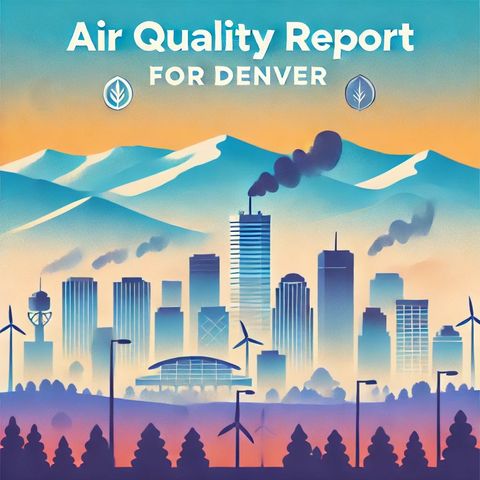Denver Air Quality Fluctuates Due to Weather, Emissions, and Wildfires

Download and listen anywhere
Download your favorite episodes and enjoy them, wherever you are! Sign up or log in now to access offline listening.
Denver Air Quality Fluctuates Due to Weather, Emissions, and Wildfires
This is an automatically generated transcript. Please note that complete accuracy is not guaranteed.
Description
Today in Denver, the air quality is experiencing fluctuations due to a combination of factors including weather patterns, vehicular emissions, and regional wildfires. As of the latest measurements, the Air...
show moreThe AQI is a crucial metric that helps residents understand how clean or polluted the air is and lays out the potential health effects. The index categorizes air quality into six levels, from good to hazardous. In terms of specific pollutants, both particulate matter, particularly PM2.5, and ozone are significant contributors to the current air quality concerns in the city.
Particulate matter, specifically smaller particles known as PM2.5, can penetrate deep into the respiratory system, causing a myriad of health issues. These fine particles often originate from sources like vehicle emissions, industrial processes, and wildfires, which have been notably active in nearby regions. Ozone, on the other hand, forms when pollutants emitted by cars, power plants, and other sources chemically react in the presence of sunlight. High ozone days typically occur during the summer months when sunlight is abundant.
Denver’s weather conditions today have played a considerable role in shaping the air quality. Temperature inversions, where a layer of warm air traps pollutants near the ground, can exacerbate pollution levels. Winds, or the lack thereof, also impact how pollutants disperse; on calmer days, pollutants tend to remain stagnant over the area, leading to poorer air quality.
For residents of Denver, it is important to stay informed about current air quality levels, particularly those with respiratory conditions, the elderly, and young children. The Colorado Department of Public Health and Environment regularly updates air quality forecasts and provides health advisories tailored to protect the public. When the AQI reaches unhealthy levels, it is advisable to minimize outdoor activities, keep windows closed, and use air purifiers to maintain indoor air quality.
Furthermore, individual actions can contribute to improving air quality in the long term. Reducing vehicle usage by carpooling, using public transport, or switching to cycling and walking can help lower emissions. Advocating for and supporting policies aimed at reducing industrial emissions and promoting renewable energy sources is another critical step.
Overall, while today's air quality in Denver poses certain challenges, being well-informed and actively taking steps to minimize exposure can help residents effectively manage their health and well-being.
Information
| Author | QP-5 |
| Organization | William Corbin |
| Website | - |
| Tags |
Copyright 2024 - Spreaker Inc. an iHeartMedia Company
